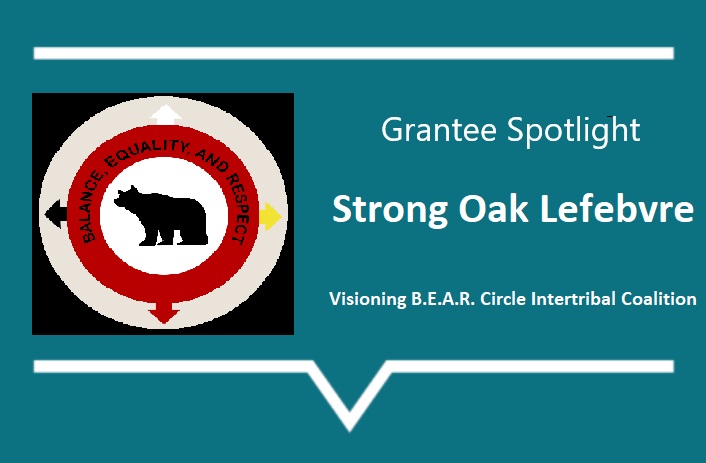We spoke with Strong Oak Lefebvre, Executive Director of Visioning B.E.A.R. Circle Intertribal Coalition, an organization that provides prevention education, training, and technical assistance to indigenous and multicultural communities who wish to eliminate interpersonal violence in their tribal, intertribal, or other types of communities.
In 2020, Visioning B.E.A.R. was awarded a RALIANCE grant to expand its prevention work to keep children safe using its indigenous circle process in both Tribal and Urban Development Communities, as Strong Oak explains.
RALIANCE: Can you briefly tell us what Visioning Bear Circle Intertribal Coalition does and who you serve?
Strong Oak: We are a sexual violence prevention organization serving the intertribal community throughout New England and nationally. We primarily do prevention work from a decolonization perspective from before the settlers arrived, using a restorative, transformative justice approach in our work.
RALIANCE: What are some of the particular challenges of sexual violence in tribal communities, and how is your organization combatting them?
Strong Oak: There’s a lot of lateral violence in our community, and that’s because of the role of the State and Federal governments. The Federal Government has decided who can be a Federally recognized tribe based on blood quantum and the criteria that they set in place, and, as we know, blood criteria have been used in a horribly oppressive way throughout history. A lot of tribes are relooking at that, and there’s no consistency throughout the United States as to how the quota system works.
If you believe that all sentient beings require consent, then you must expand the relationships where sexual and domestic violence can occur. You won’t have any violence if you treat everything as sacred and equal to yourself. So, to teach the children the equity, the connection to the land, that the land talks to people is to instill a deep respect for all living things.
Our curriculum is called Walking in Balance with All Our Relations, it is composed of 13 modules. One is simply about the circle process, building trust, and making agreements. We use a three-hour session to do that. We ask: What is our name? Who are our people, and where are we from? So many cultural things can come up, and we teach this to all cultures because we feel like everybody needs to experience a different way of seeing with a different value system. It’s been transformative what we’ve been able to do.
RALIANCE: Can you talk about how your RALIANCE grant helped your organization? Did it help build the curriculum, or did it help with something else specific?
Strong Oak: We spent three and a half years building a relationship with folks on Wind River before we ever went in with the RALIANCE grant, and we already had the curriculum. The Wind River reservation is where activities coming from the grant took place. We did about eight or nine groups of women walking in balance. What was unusual about that work was that we had people who had harmed and people who had experienced harm together in the same groups because there virtually was nobody who hadn’t done some harm. We did that and found so much trauma was released in this. Our groups were about 11 in each group, and we went over three hours because people had so much to say.
A lot of racist oppression comes into play in this reservation because there in Wind River, they had both the Northern Arapaho and the Shoshone occupying the same land. They were historically in conflict and put on the same piece of land when the reservation was formed. When we did our group, we had both northern Arapaho and Shoshone present in the same group. There was a lot of healing opportunity there and a lot of acknowledgment that the children, some of whom were northern Arapaho and Shoshone, were being forced to choose one tribe over another. Hopefully, the children will overturn that down the way because, as time goes by, most of the total will be both.
Although it was during the pandemic, we were able to push forward. So, the first two groups were able to be done in person. We had the first group where we came in to teach, so the teaching team was from Visioning Bear. The following time, we had a combination of some of us and some teachers from the community who had completed the training. Then, going forward, all the people from the reservation were teaching each other.
RALIANCE: What advice would you give to our readers who are interested in supporting Visioning Bear’s work and survivors in tribal communities more broadly?
Strong Oak: We would advise readers to visit our website, where many videos and podcasts can be accessed. We also have a YouTube channel. Every year, VBCIC hosts a Transforming the Culture of Power Conference. This coming year, the Conference will be held May 7-9, 2024, at Woolman Hill Conference and Retreat Center in Deerfield, Massachusetts. Tribal leaders and traditional teachers from the U.S. and Canada will share stories and host ceremonies throughout the three-day event. Gender violence prevention will be taught from an Indigenous transformative lens.
+++
RALIANCE provides consulting, assessment, and employee development services to help build more equitable workplace cultures and create environments free from sexual harassment, misconduct and abuse. We stand ready to support your organization’s goals – contact us today at info@raliance.org to get started.

